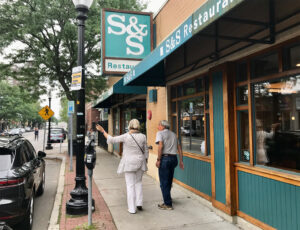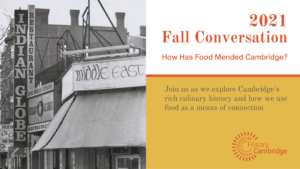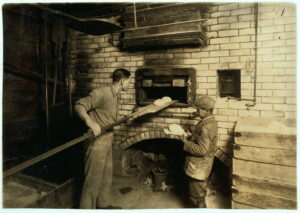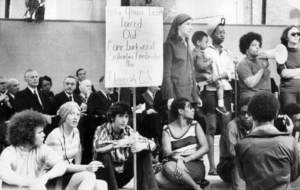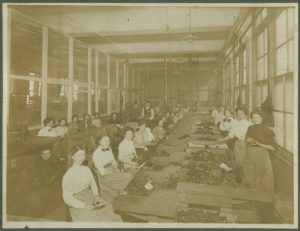Posts Tagged ‘immigration’
S&S Restaurant is still serving up the comfort after more than a century in Inman Square
by Deb Mandel, 2022 In the decade preceding Cambridge Electric Light’s illumination of Cambridge Street, when trolley tracks ran from Inman to Porter Square, a little delicatessen began welcoming hungry patrons. From its opening in November 1919, Rebecca “Ma” Edelstein greeted guests with “es and es,” Yiddish for “eat and eat” – the phrase that lent the…
Read MoreCambridge and the Smallpox Epidemic, 1893-1903
By Beth Folsom, 2021 In our current era of COVID-19, heated discussions of vaccine mandates and the class and racial tensions inherent in these conversations may seem like a contemporary dilema, but an examination of Cambridge at the turn of the 20th century reveals that the city engaged in similar debates around the issue of…
Read MoreFall Conversation: How Has Food Mended Cambridge?
Over the course of 2021, History Cambridge has been exploring the ways in which the city has repaired its social, economic, and political fabric in the wake of historical crisis points—as well as the ways in which the need for mending remains. As a means of both physical and emotional nourishment, food has played a…
Read MoreWaves of Cambridge Migration: An Update
By Doug Brown, 2018 Why do people uproot their lives, move far from friends and family, and suffer the indignities that often come with being “new” to a place? Sometimes it’s for an education, or a different job, or a new relationship. Or maybe it’s simply to escape difficult circumstances, to reinvent oneself. The short…
Read MoreEarly Days at Newtowne Court
By Jane McGuirk Richards, 2014 We moved into Newtowne Court, door 30, apartment 265, in 1938, when I was one year old. We were among the first families to move in. There were seven of us, five children—two sets of twin girls and a single boy. Newtowne Court was a new concept in low income…
Read MoreSelf-Guided Tour: Women Activists of Riverside 50 Years After Suffrage
Stop 1: Begin the tour in Central Square With the passage of the 19th Amendment one hundred years ago this past August (2020), American women won the right to vote. Rather than a culmination, this event marked the beginning of a long fight for equal treatment and equity that is still far from over. Fifty…
Read More“The Absolute Majority of the Population”: Women in Twentieth-Century Cambridge
This article was originally published as a chapter in Cambridge in the Twentieth Century, edited by Daphne Abeel, Cambridge Historical Society, 2007. Inspired by Cambridge Historical Society’s 2020 theme—Who are Cambridge Women?—the author, Eva Moseley, has reviewed the manuscript and made a few updates which are noted in the text that follows. “The Absolute Majority…
Read MoreSome Aspects of the East Cambridge Story
By John W. Wood, 1956 “This paper gives a totally inadequate account of an appealingly picturesque and colorful neighborhood, the area that might have been a slum and isn’t, the step-child of the University City. “ – J. W. W. For some reason, the local history of East Cambridge has been almost completely neglected. It…
Read MoreCharles William Eliot’s Address – 275th Anniversary of the Founding of Cambridge (1905)
The following address was given by Charles William Eliot at the celebration of the Two Hundred and Seventy-fifth Anniversary of the Founding of Cambridge in 1905. It can be found in Volume 1 of the Proceedings of the Cambridge Historical Society. Mr. President, Ladies and Gentlemen, Schoolgirls and Schoolboys, and Members of the Cambridge Historical Society:…
Read MoreWhere Portuguese Families Found a New Home
By Sarah Boyer, 2013 Portuguese families from the North End of Boston and East Boston started to move into East Cambridge soon after the Civil War. Most of them had emigrated from the Azores, an archipelago 800 miles off the coast of Portugal, mainly from the largest island, São Miguel. Their numbers increased in the…
Read More
